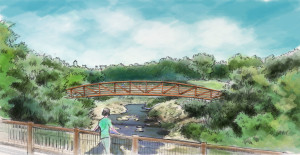Reporter’s Notebook: STRs forever (and ever)
Monday, February 22, 2016 by
Austin Monitor Airbnb talks SXSW… Once again, short-term rentals are coming back to City Council. With a phase-out of Type 2 short-term rentals still on the table, the industry’s biggest players are working to let Austinites know the value they bring to the city. And, with South by Southwest just around the corner, Airbnb has released some festival-specific data. According to the company, during last year’s festival, 17,000 guests stayed in Airbnb rentals and contributed a total of $22.8 million to Austin businesses. That, the company explains, doesn’t include the $10.2 million earned by STR owners during the festival. Though it does not have data that breaks down these rentals by type, the company reports that 85 percent of Airbnb hosts in Austin live on the premises of their rentals. This year, the company reports, “Airbnb bookings have outpaced 2015 rates significantly.”
If you can’t beat ’em, just also keep talking about STRs… As a reminder, City Council has already enacted a moratorium on new licenses for Type 2 short-term rentals in residential areas. That moratorium will last at least a year. But this Thursday, Council will consider phasing out non-owner-occupied short-term rentals in residential areas altogether, as was recommended by the Planning Commission. The phase-out would be a major victory for the dedicated opponents of STRs, but in the past week, Austin-based HomeAway developed its own enforcement policy in an effort to steer the city away from a phase-out. Late last week, Mayor Steve Adler spoke out against the phase-out as well. In a post on his website, titled “Let Moratorium on STR2s Work,” Adler laid out his opinion. “Some have proposed outlawing all existing STR 2s now and giving the owners some period of time to sell these houses. While that ultimately may be the appropriate thing to do to protect neighborhoods, it’s not a decision that needs to be made now. We need to use this moratorium to gather more information,” wrote Adler. “I am concerned that forcing STR 2 owners to sell would invite lawsuits, and as a rule our city should be very mindful whenever we are considering changing the rules after the fact.” He continued, “And we need to better understand the experience of other cities that have outlawed STR 2s so as to make sure we really understand any risks of a ban forcing STR 2s underground.”
ZAP is Grossed out… Members of the Zoning and Platting Commission appeared to express collective regret last week for the role they may have unwittingly played in the ouster of Scott Gross from his job as a consulting engineer for the Austin Transportation Department. Gross recently resigned his position after he was put on administrative leave by City Manager Marc Ott in response to his use of the satirical “Judgmental Austin” map during a Jan. 19 presentation. Commissioner Jolene Kiolbassa, who was the first to tell Gross after his presentation that the map was inappropriate, penned a letter of support for Gross to Ott that the commission voted 9-1 to endorse on Tuesday. In addition to praising Gross’ seven years of service to the city, the letter stated that Gross apologized for the map and “we found his apology sincere.” Commissioner Dustin Breithaupt was the lone vote against the letter. He told the Austin Monitor afterward that his vote was not a reflection of his opinion on Gross’ conduct but rather of his belief that “it’s an HR issue.” During discussion, Commission Chair Gabriel Rojas said, “From what I understand, city management is upset that we’re even talking about this.”
Degrees of separation… A presentation from city legal Tuesday on “walking quorums” had members of the Zoning and Platting Commission scratching their heads. Assistant City Attorney Sabine Romero had reminded commissioners that they should try to avoid communicating with a group of fellow commissioners large enough to constitute a quorum of the commission, including by email and on social media. Commission Vice Chair Jackie Goodman said it didn’t make sense that she couldn’t even email simple questions, including about the agenda at future meetings, to her fellow commissioners. Instead, she said, she was obligated to send those messages to the commission’s staff liaison, Andrew Rivera, who then forwards them to fellow commissioners. Romero responded that the requirement was simply a way to prevent commissioners from engaging in dialogue about a commission-related issue without the legally required public notice. Thus, staff forwards the email to the chair of the commission and then blind carbon copies all other commissioners, to prevent a member from accidentally hitting reply-all and triggering an illegal meeting. “I still don’t follow how it’s OK if Andrew does it, but not if I do,” responded Goodman. Commission Chair Gabriel Rojas suggested it was maybe just a greater “degree of separation.”

They have a bridge… Last week, developers of the Grove at Shoal Creek seem to have (finally?) made the Bull Creek Road Coalition happy, for now, with their announcement that the planned unit development will now include a bicycle and pedestrian bridge that will span Shoal Creek. The bridge (depicted here) will be added to the master plan and will be funded and built by the developers. There may be one hiccup, though. This weekend, the Monitor got word from City Council Member Leslie Pool’s office that the proposed location of the bridge is at the north end of the property, not the southern end, for which Pool and other residents have advocated due to its proximity to Shoal Creek Boulevard.
You're a community leader
And we’re honored you look to us for serious, in-depth news. You know a strong community needs local and dedicated watchdog reporting. We’re here for you and that won’t change. Now will you take the powerful next step and support our nonprofit news organization?










